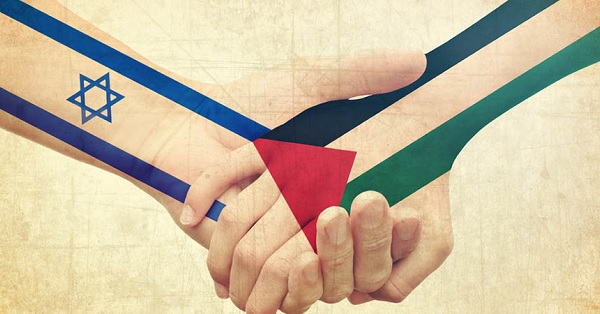As global crises typically do, the Coronavirus – its spread, and the looming threat it poses to humankind – provides us with a sense of perspective.
COVID-19 does not discriminate between Israelis and Palestinians. When threatened by this deadly virus, the two peoples worry together and work together to save lives.
When the forces of nature remind us how vulnerable we are – how equally vulnerable we are – we are humbled. And humbled before these forces, we demonstrate our shared humanity.
When Israel was hit by a monstrous fire, Palestinian firefighters crossed the Green Line with their firetrucks and risked their lives to save Israelis. And when Palestinians are hit by COVID-19, Israel’s public health professionals work side by side with their Palestinian colleagues, supplying them with test kits, medicine and knowhow. “There are no borders here…There is no ‘them’ and ‘us,’” Brig. Gen. Ghassan Alian, the commander of Israel’s Civil Administration in the West Bank, told Israel Radio last week.
In such times, you cannot but wonder why Israelis and Palestinians do not harness their shared humanity, their common sense and their sense of common future to end the bloody conflict between them. Unlike pandemics, wildfires and earthquakes, the Israeli-Palestinian conflict is manmade. And this manmade calamity can be undone by humans – if they find it within themselves to relate to the other as humans, as equals, as equally human.
We at Americans for Peace Now know as well as anyone how complicated the conflict is. We’ve been documenting it and advocating ways to address and resolve its components for many years. We know how difficult it is to untangle the knots of problems like Jerusalem sovereignty, Palestinian refugees, security arrangements, and Israeli settlements in the West Bank. We know that this is not a “senseless” conflict, as some often depict it. It is a conflict between two national movements which claim the same piece of land. In some ways, this is a zero-sum conflict.
But we also know that in recent years, it was mainly attitudinal problems – attitudes among Israeli and Palestinian publics and leaders (and now the White House as well) – which obstructed progress toward conflict resolution. And we know that despite the zero-sum nature of the conflict, there is a win-win compromise solution for it, waiting to be adopted and implemented.
The COVID-19 pandemic will eventually abate and eventually disappear. We don’t know when and we don’t know how many of us, here in America and in the Middle East, it will impact.
We also know that once Coronavirus is contained and defeated, the Israelis and Palestinians that we so deeply care about will be left with a malignant conflict that has been plaguing their societies for almost a century.
There is a viable solution to this conflict, and we hope that the traumatic experience we are currently experiencing will make the solution easier to comprehend, grasp, and achieve.
We at APN, and our brothers and sisters at Israel’s Peace Now movement, will committedly continue to make our contribution to resolving the conflict.
In the coming days and weeks, APN’s staff members will be working offsite, away from our Washington DC office. Regardless, we will do our utmost to provide you with the high-quality educational materials on the conflict that you expect from us.
This is a difficult time for all of us, a truly tumultuous time for nonprofit organizations like ours. Knowing that we can rely on your support allows us to brave the challenges and continue working – both in Israel and the United States – to help pave the way toward conflict resolution.
Thank you for your support,
James B. Klutznick, Chair of the Board
and
Aviva Meyer, Vice Chair of the Board and Acting CEO
